Federation of Ambedkarite and Buddhist Organisations UK along with Lord Harries of Pentregarth, organised a meeting and academic discussion entitled “Dr BR Ambedkar – His life and work” at the House of Lords on 7 May. It was a day dedicated to discussing the legacy of Dr BR Ambedkar, the father of the Indian constitution.
The meeting was chaired by Lord Harries of Pentregarth, member of the House of Lords and Chair of All-Party Parliamentary Group for Dalits. However, the driving force behind the meeting was Ms Santosh Dass MBE, President, Federation of Ambedkarites and Buddhist Organisations UK (FABO,UK) and the Chair of the Anti Caste Discrimination Alliance. She successfully gathered a room full of academia, activists, political leaders, filmmakers and members of the Dalit community together to talk about Dr BR Ambedkar.
Covering a vast number of topics, from the works and visions of Dr BR Ambedkar and how that has impacted the lives of many in India and across the globe to how his teachings stand true after nearly nine decades. The panel also discussed widely about caste discrimination law campaign in the UK, Ambedkar’s take on gender equality, feminism, and other related topics.
The esteemed panel of speakers included: Dr Meena Dhanda, Professor of Philosophy and Cultural Politics, University of Wolverhampton; Baroness Shreela Flather, an invited guest of honour; Arun Kumar, General Secretary FABO UK; Ms Simple Rajrah, a post-doctoral student at the University of Oxford; Dr Renu Raj, a Humanitarian and CEO of RADANKS; Dr Pushpinder Chowdhry MBE, Founder and Director of the Asian Film Festival; Dr Prerna Tambay, a Human Resources Manager and Entrepreneur; and Mr Ravi Kumar, the General Secretary of Anti Caste Discrimination Association ACDA.
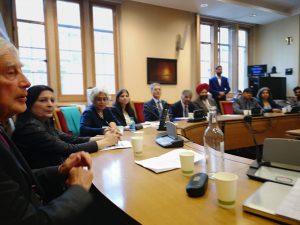
Opening the meeting Lord Harries said “Dr Ambedkar was academic, politician, social reformer, economist, jurist, and inspired the Buddhist movement. He was responsible for India’s Constitution”. He said he was looking “forward to hearing from the great lineup of speakers”.
Speaking about the life and work of Dr BR Ambekdar, Ms Dass said: “India and activists like me around the world have a lot to thank Babasaheb Ambedkar for. He was an extraordinary man” In India, as well as abolishing untouchability, he secured social and legal rights for workers and equality for the people enshrined in India’s constitution…” We marked Labour Day a few days ago.
“As Labour leader and Member of the Viceroy’s Executive Council between 1942 and 1946 he secured many legal protections for workers including, a reduction in factory working hours (from 12 to 8 hours); compulsory recognition by employers of Trade Unions, requirement for settlement of industrial disputes; laws for working women including maternity benefits for women; equal pay for equal work; protections for coal miners; and a minimum wage.”
“When it comes to India, I continue to be alarmed and distressed that my country of birth has become a place where academics and great minds of our generation are being openly imprisoned and intimidated… Human rights activists like Professor Siababa falsely jailed for being a Maoist and others like Dr Anand Teltumbde who has had the threat of imprisonment with trumped up charges hanging over him since last summer. These two and many others need the support of the international community and freed to continue to give a voice to the voiceless.”
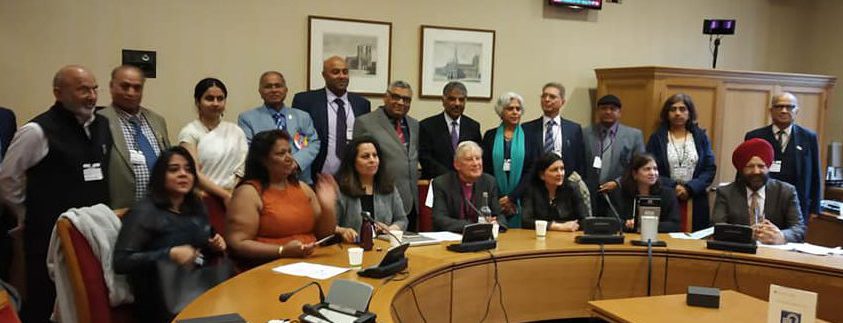 Dr Meena Dhanda , Professor of Philosophy and Cultural Politics, University of Wolverhampton spoke on the topic of ‘Dr Ambedkar on Religion and Morality’. In her presentation she used a quote from Dr Ambedkar’s book “The Buddha and his Dhamma”: “Every religion preaches morality, but morality is not the root of religion. It is the wagon attached to it. It is attached and detached, as the occasion arises.”
Dr Meena Dhanda , Professor of Philosophy and Cultural Politics, University of Wolverhampton spoke on the topic of ‘Dr Ambedkar on Religion and Morality’. In her presentation she used a quote from Dr Ambedkar’s book “The Buddha and his Dhamma”: “Every religion preaches morality, but morality is not the root of religion. It is the wagon attached to it. It is attached and detached, as the occasion arises.”
In contrast, she said “morality is dhamma, and dhamma is morality… in dhamma, the need for morality does not arise from the sanction of God but directly from the need of man to love man. So rather than the rituals and sacrifices embedded in religion, Ambedkar considered morality itself as sacred.”
According to her, the reasons Ambedkar gives for making morality itself sacred is that there is a social need for it to protect what he calls the best. The best, however, he does not equate with the fittest. The best may actually be the weak – the ones who are in need of protection. Morality as dhamma must impose restraints on the fittest to stop them from infringing on the rights of the weak.
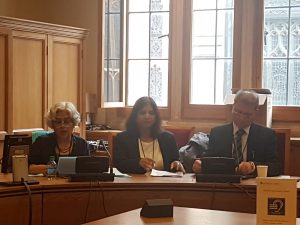
Baroness Shreela Flather, in a candid and moving speech, mentioned three Hindu Parliamentarian peers who had voted against caste discrimination law when there was a vote in the chamber. “I am really shocked… if we have a community of communities, we will never have an integrated society.”
“I am not liked by the Hindus because I am anti-caste. I am not liked by the Muslim organisations and Muslims because I am anti-Sharia. So I’m even-handed about it. These things really are not acceptable. The interesting thing about it is, caste is not allowed in India. You are not supposed to discriminate on the basis of caste. You are not supposed to discriminate against women.”
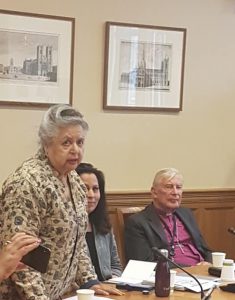 “What do we do in India – do we follow those things?” questioned the Baroness.
“What do we do in India – do we follow those things?” questioned the Baroness.
“There are more laws to protect women in India than there are here. But we don’t enforce them. If you have two laws and enforce them, it’s better than to have ten and not enforce any. My first complaint is about India, because it’s going in the direction that none of us here would like. It’s getting more and more divided… do we follow the constitution that Ambedkar wrote, no, we do not follow even the basic things… what he (Dr BR Ambedkar) did for India, the rules he laid down are far more important than Gandhi’s idea of going back to rural raj. If India had followed Babasaheb (Ambedkar) and did the things he said and taught, we would’ve been in a very different place,” said the Baroness.
The next speaker was Arun Kumar, the General Secretary of FABO, UK. Speaking about FABO UK’s campaign to raise awareness of Dr Ambedkar: “FABO UK has worked with the Indian High Commission and installed a bronze bust in India House, the High Commission where the room is now called Ambedkar Hall.
“Similar installations were made in the London School of Economics where he studied in 1921-22 and donated a bronze busts to the Columbia University, in New York from where he completed his PhD in Economics in 1927 and Simon Fraser University, Vancouver, Canada.”
“In 2014, Ms Santosh Dass FABO UK, spearheaded and robustly lobbied for over a year the Government of Maharastra to fund the purchase of the £3.1 million 10 King Henry’s Road, London where Dr Ambedkar lived during his studies in London. GOM finally purchaed the house in September 2015. The Ambedkar House is now a memorial open to the public.”
Simple Rajrah, an MPhil in Political Theory from the University of Oxford, spoke about “Dr Ambedkar’s contribution to political theory.” She stated that Dr Ambedkar was extremely conscious about the grandeur and flamboyant text that not only enraptured the imagination of those who were oppressed, but also those who were oppressing. “He was very crisp in analysing the weak points of these traditions that have withstood centuries, such as Brahmanism… he had disrespect for those texts that were philosophically dishonest.”
Quoting Dr Ambedkar, she said “Liberty cannot be divorced from liberty, nor can liberty and equality be divorced from fraternity. Without equality, liberty would produce supremacy of a few over many. Equality without liberty on the other hand would kill any sort of individual initiative.”
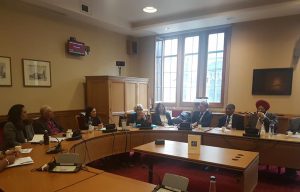
Dr Renu Raj, a humanitarian and CEO of RADANKS UK, spoke about Dr Babasaheb Ambedkar’s contribution towards the emancipation of Indian women. “We cannot forget him (Ambedkar) till the sun rises. Like the sun cannot be covered by any cloud, Babasaheb Ambedkar will never be forgotten by any of us … apart from him, no other leader has done anything for women in India.”
“I measure the progress of a community by the degree of progress that women have achieved,” she quoted Ambedkar.
Dr Pushpinder Chowdhry MBE, the Founder and Director of the UK Asian Film Festival, spoke about gender equality. A film about Dr Ambedkar by was screened at the Asian Film Festival in the 90s. “For me, that was the turning point of knowing who he was and it gave me encouragement to learn more about him. What I took out of the film was, when people were fighting for independence, he wanted human rights. His theory was if we got independence from the British Raj, it would make no difference to his community.”
“Because it will just be replaced by the higher caste of Indian society, so no independence till we instituted human rights into the constitution… everybody has seen Gandhi, but how many have seen this documentary?” Talking about the movie, she said: “We need all to remove gender equality. The subject is layered with social, political, and economic issues.”
The next topic of discussion was about Dr Ambedkar and feminism, where Dr Prerna Tambay said, “There’s an urgent need to turn to Dr Ambedkar for feminist discourse. The current discourse focuses on gender in isolation, but there is an urgent need to add, caste, and other factors in the discourse of feminism…In his seminal paper, ‘Caste in India’, 1916 he explained that caste appeared in Indian context when differences appeared within groups – the Aryans, Dravidians, and Mongolians, caste came into emergence. He refers to caste as enclosed groups characterised by endogamy, mainly marriage within the group. It was the priestly class that first enclosed itself, thus shutting itself in and others out…He believed that the class-gender nexus was the main culprit behind the oppression of women and lower caste.”
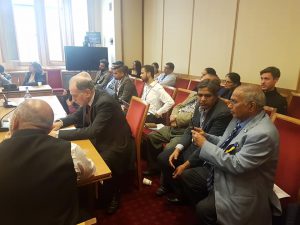
Ravi Kumar, the General Secretary of Anti Caste Discrimination Alliance (ACDA) in the UK was the last of the speakers. Speaking about the changes the organisation brought about, he mentioned how their report “A hidden apartheid – a voice of the community” in November 2009 was critically timed just ahead of the passage of the Single Equality Bill in 2010. “In the past 10 years, ACDA initiated many joint statements on atrocities against our people in India and on caste discrimination here in the UK, providing PQs (Parliamentary Questions) and briefings to parliamentarians in the UK and to the UN Committee for the Elimination of Racial Discrimination. That is one of our key strengths… one thing that I have learnt from the past ten years is the importance of having visible Dalit leaders. Dalits are often underrepresented in leadership positions and this matters.”
The event closed with blessings from Venerable Vijithavansa Thero, the Dhamma Head of West London Buddha Vihara.
Smita is a multi-cultural freelance journalist, writer, and filmmaker based out of the US, London, Hong Kong, and India. Global Indian Stories is her brain-child. Created to chronicle diaspora stories written by Indians of all age groups, from different walks of life across the globe, Smita makes sure that the platform remains inclusive and positive.
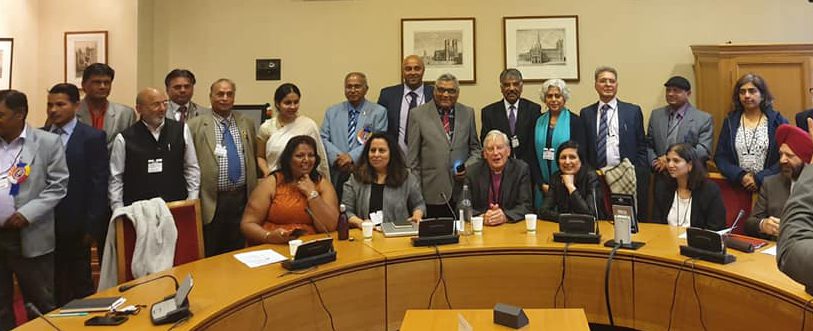

![Powerful Pride documentary Legendary Children [All Of Them Queer] streaming very soon](https://globalindianstories.org/wp-content/uploads/2025/06/Legendary-streaming-release-featured-238x178.jpg)



![Powerful Pride documentary Legendary Children [All Of Them Queer] streaming very soon](https://globalindianstories.org/wp-content/uploads/2025/06/Legendary-streaming-release-featured-100x75.jpg)

